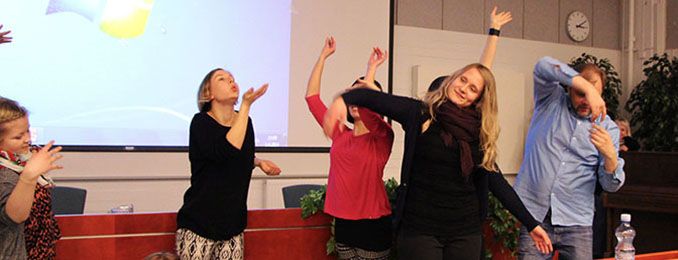
Halaten Supports Refugee Minors
Unaccompanied refugee minors arriving to Finland need support. HALATEN – From Vulnerable Childhood to Healthy and Safe Adulthood project aims to measure up to this need.
Text and photos: Mikko Salminen, TUAS Communications Trainee
“The most challenging thing for us has been reaching the young who are in need of this support. Both we and our research partners have had difficulties in contacting them, even though we have had experts helping us out. Now, after six months since the launch of the project, we have finally succeeded in this and gained the confidence of the young,” says Outi Arvola, the project manager of the HALATEN project, from TUAS.
HALATEN – From Vulnerable Childhood to Healthy and Safe Adulthood is a joint project between TUAS and the Institute of Migration. Part of the project’s funding comes from the European Refugee Fund (ERF). The project aims to find and develop support forms for unaccompanied minors who arrive in Finland and to enhance their integration into the Finnish society. Students in the degree programmes in Social Services and Occupational Therapy have been provided with the chance to test these developed support forms at different events and camps organised during the project. In future, we will obtain support from professionals and future professionals in physiotherapy too.
Getting to know and making friends with these minors is the most effective way to integrate. It is way too often than a refugee minor is left alone after arriving in Finland even though he/she officially is being supported.
“Many of them experience loneliness. During the interviews, many minors told that, even after a long time in the country, they still do not have any Finnish friends. Traumatic memories from their home country and uncertainty of reuniting with their loved ones often enhance this feeling of loneliness,” says Senior Researcher Krister Björklund from the Institute of Migration.
Legislation makes it worse for families to reunite
The current legislation does not allow a young person in Finland to initiate a family reunion process. The “ball” is in the court of the family waiting in the home country.
“Not many families can afford to reunite their family. The application for reuniting of family members must be completed at a Finnish embassy and, for instance, in Mogadishu, Somalia, there is no Finnish embassy. Therefore, travelling to a neighbouring country might be the only, yet expensive, alternative,” explains Björklund.
TUAS is tackling these problems of loneliness by using functional methods.
“Our goal has been and is to listen to the thoughts of unaccompanied minors on these used methods. It is not wise to impose things on anyone. Meeting face-to-face and having a genuine interest in their matters is the key thing. At an expert and authority level, the discussion could be more fruitful. At the moment, persons working in reception centres and with integration matters rarely discuss with each other on these issues,” says Lecturer Anu Kuikkaniemi from TUAS.
Long-lasting results
At the moment, there are various ongoing programmes and projects. As for the HALATEN project, long-lasting results and solutions have been striven for already in the course of the project.
“Our wish is that our work would go further than just be left hanging at a report level. The purpose is that our operations and functional support forms developed during the project would continue also after the project ending. Therefore, we have started to plan different student projects related to the integration of unaccompanied minors,” says Arvola.
At the seminar organised on 1 April at the Ruiskatu campus, students from different fields familiarised themselves with the HALATEN project activities through workshops.
The workshop led by occupational therapy students prepared the participants for the theme of the day and warmed them up for James Nikander aka Musta Barbaari, who has moved from Turku to Helsinki when he was in primary school.
In addition to TUAS and the Institute of Migration, the following parties in the field of immigration and child welfare have also taken part in the project:
Turku parental support and shelter home (Turun ensi- ja turvakoti ry), Federation of Special Welfare Organisations (EHJÄ ry), Care Component, Family Federation of Finland (Väestöliitto), Central Union for Child Welfare (Lastensuojelun keskusliitto), Save the Children (Pelastakaa lapset), Federation of Professional Foster Homes (Ammatillisten perhekotien liitto), and Institute of Migration (Maahanmuuttovirasto).